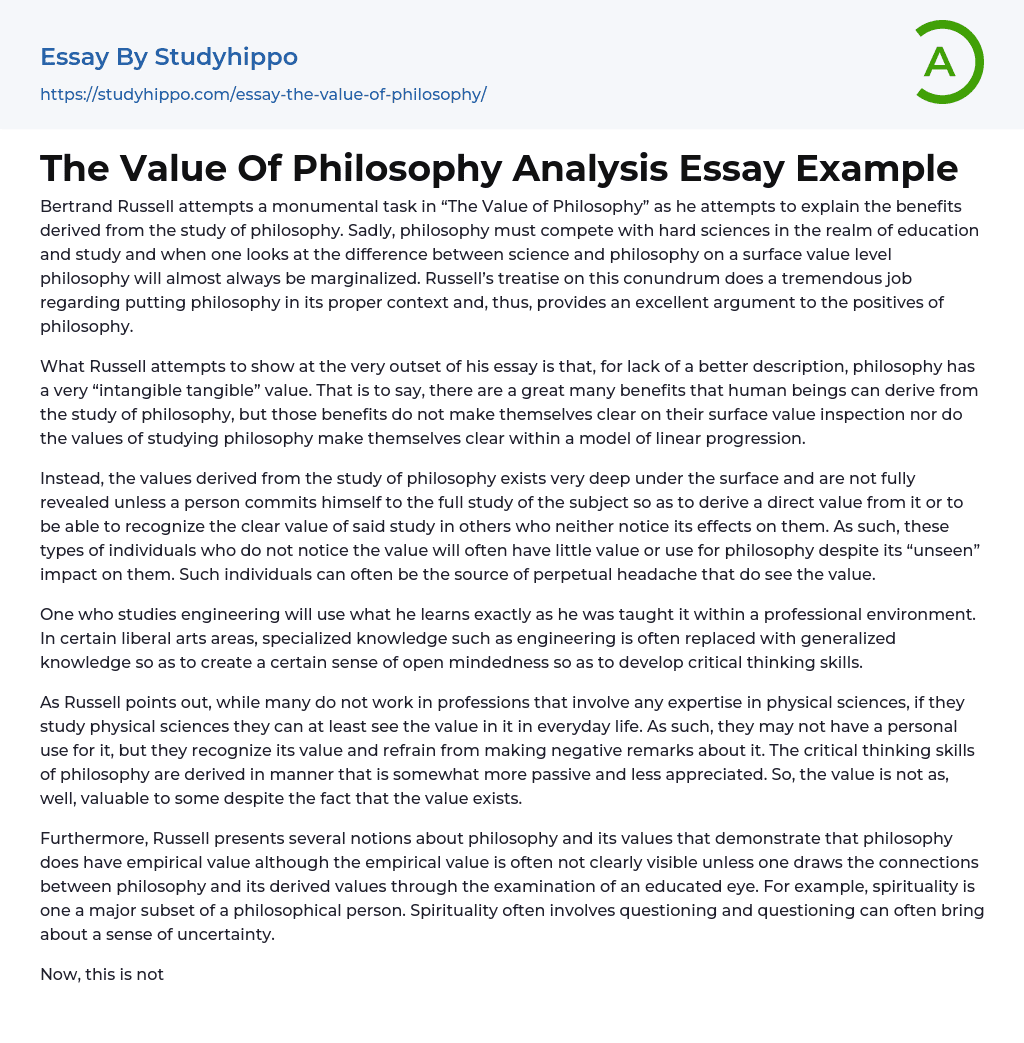Bertrand Russell attempts a monumental task in “The Value of Philosophy” as he attempts to explain the benefits derived from the study of philosophy. Sadly, philosophy must compete with hard sciences in the realm of education and study and when one looks at the difference between science and philosophy on a surface value level philosophy will almost always be marginalized. Russell’s treatise on this conundrum does a tremendous job regarding putting philosophy in its proper context and, thus, provides an excellent argument to the positives of philosophy.
What Russell attempts to show at the very outset of his essay is that, for lack of a better description, philosophy has a very “intangible tangible” value. That is to say, there are a great many benefits that human beings can derive from the study of philos
...ophy, but those benefits do not make themselves clear on their surface value inspection nor do the values of studying philosophy make themselves clear within a model of linear progression.
Instead, the values derived from the study of philosophy exists very deep under the surface and are not fully revealed unless a person commits himself to the full study of the subject so as to derive a direct value from it or to be able to recognize the clear value of said study in others who neither notice its effects on them. As such, these types of individuals who do not notice the value will often have little value or use for philosophy despite its “unseen” impact on them. Such individuals can often be the source of perpetual headache that do see the value.
One who studies engineering will use what he learns exactly a
he was taught it within a professional environment. In certain liberal arts areas, specialized knowledge such as engineering is often replaced with generalized knowledge so as to create a certain sense of open mindedness so as to develop critical thinking skills.
As Russell points out, while many do not work in professions that involve any expertise in physical sciences, if they study physical sciences they can at least see the value in it in everyday life. As such, they may not have a personal use for it, but they recognize its value and refrain from making negative remarks about it. The critical thinking skills of philosophy are derived in manner that is somewhat more passive and less appreciated. So, the value is not as, well, valuable to some despite the fact that the value exists.
Furthermore, Russell presents several notions about philosophy and its values that demonstrate that philosophy does have empirical value although the empirical value is often not clearly visible unless one draws the connections between philosophy and its derived values through the examination of an educated eye. For example, spirituality is one a major subset of a philosophical person. Spirituality often involves questioning and questioning can often bring about a sense of uncertainty.
Now, this is not an inherently bad thing as many assume that questioning refers to challenging and uncertainty refers to weakness. In reality, questioning and uncertainty are merely variants of clarifying. There is clearly nothing wrong with clarification of one’s beliefs or any particular subject. However, in many cases the answers may not b readily available so there will be a need to contemplate.
That is to say that by contemplating one’s beliefs,
one’s profession, one’s knowledge base one not only learns about the subject matter at hand, but one also learns about the self. When seeking knowledge on any subject one ultimately ends up with developing a sense of self knowledge. Hence, that remains the true value of philosophy and although Russell does not explicitly state that this is the main value of philosophy, he comes very close to doing so.
In his description of what contemplation involves, he refers to being able to look at the infinitestemal fragments of the subject matter. What this refers to is seeing a subject far beyond what it appears on the surface and instead getting to the true essence of the subject and viewing it for what it truly is and what it is truly worth. This requires a great deal of work and a great deal of contemplation. Hence, not very many people may be wiling to put forth the immediate effort especially when the results of said effort do not bear a gain immediately.
However, for those who do invest their time wisely and contemplate the end results will be provided as a reward. While Russell may not have been able to prove to everyone the value of philosophy, he does craft a compelling argument for the positives that it can provide for those who invest the time to study it. Often, the rewards of the stuffy may not reveal themselves on the surface, but this is fine. After all, what value could there be in anything that is only superficial?
- Age Of Enlightenment essays
- Ethos essays
- Time essays
- Acceptance essays
- Meaning Of Life essays
- Reality essays
- Natural Law essays
- Political Philosophy essays
- Utilitarianism essays
- Existence essays
- Free Will essays
- Good And Evil essays
- Confucianism essays
- Relativism essays
- Conscience essays
- Environmentalism essays
- Empiricism essays
- Epistemology essays
- Ethics essays
- Existentialism essays
- Human Nature essays
- Individualism essays
- Metaphysics essays
- Philosophy Of Life essays
- Transcendentalism essays
- Truth essays
- Destiny essays
- Determinism essays
- Fate essays
- Functionalism essays
- Philosophers essays
- Pragmatism essays
- Future essays
- Child Observation essays
- Critical Reflection essays
- Teaching Philosophy essays
- Personal Philosophy essays
- Action Speak Louder Than Words essays
- Can Money Buy Happiness essays
- Values of Life essays
- Ethical dilemma essays
- Normative Ethics essays
- Virtue Ethics essays
- Belief essays
- Deontology essays
- Moral essays
- Virtue essays
- Work Ethic essays
- Henry David Thoreau essays
- Carl Jung essays




